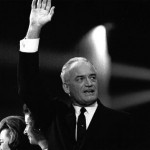Tea Party Won't Share Goldwater's Fate

After last week’s U.S. primaries that saw conservative Tea Party candidates wipe the floor with establishment rivals, some Republicans fear if the trend continues, the 2012 presidential election will be 1964 all over again.
That was the election where Barry Goldwater, the voice of Republican conservatism, beat his moderate rival Nelson Rockefeller for the Republican nomination, and proceeded to lose the election by one of the greatest disparities in U.S. history.
Lyndon Johnson, anointed president after the assassination of John Kennedy less than a year earlier, won 61% of the popular vote - the largest win in modern times.
In 1964, Democrats won 44 of 50 states. Some feel that the Tea Party movement threatens a repeat disaster for the Republicans in 2012. A foretaste of this concern may emerge in the Nov. 2 midterms, if Tea Party candidates (who beat moderate rivals in the primaries) lose to Democrats.
While apprehensions are justifiable, a case can be made that there’s no real comparison between 1964 and 2012 – that Barry Goldwater and the Tea Party movement have little relationship to each other.
Yes, Barry Goldwater was something of a conservative upstart who won his party’s nomination, with all but a few Republican big names reluctant to support him. There was even a “Republicans for Johnson” faction in the election.
Goldwater himself contributed to propaganda against himself, such as advocating limited nuclear weapons in the Vietnam war. His celebrated slogan “You know in your heart that he’s right,” was corrupted by Democrats - “You know in your guts that he’s nuts.”
Richard Nixon (who was to be elected president in 1968) reluctantly backed Goldwater, as did Ronald Reagan, enthusiastically. Former President Dwight Eisenhower, ever a fence-sitter, said nothing and did nothing for the party.
The split among Republicans in 1964 was exacerbated by the hurt Americans felt at the assassination of Kennedy – questions about a conspiracy, a theme that still lingers.
In 1964, pressure was acute to continue the Kennedy legacy through Lyndon Johnson, despite that mutual acrimony and dislike between Johnson and Robert Kennedy.
Today’s split among establishment Republicans and Tea Partiers is different. Key to Tea Partiers is hostility to the Obama policies – and the inept performance of Republicans to counter what is seen as Obama’s disastrous innovations.
Unlike the national mood in 1964, the Tea Party concerns today are reflected throughout the country. Moderate Democrats are uneasy about what Obama Democrats are doing – or not doing. Obama’s plunge in popularity was perhaps inevitable, but it also reveals disillusion. And opportunity.
When it comes to the 2012 election, it’s difficult to see how the most ardent Tea Party acolyte or diehard moderate Republican can avoid voting together for the party against the Democrats whom, they both feel are wrecking the country.
Democrats disillusioned with Obama may not vote Republican, but they’re unlikely to come out in the numbers for their party as they did in 2008.
A few nutbars in Republican ranks, like Christine O’Donnell who toppled sure-Republican winner Mike Castle in the Delaware primary, may be annoying but she is hardly a calamity. All political parties have a share of cranks – witness the Democrats’ Charles Rangel in New York.
In summation, the Tea Party is a manifestation of America’s concern about the direction it is heading. It is more than a malcontented faction, it’s a national movement.
Wait and see.